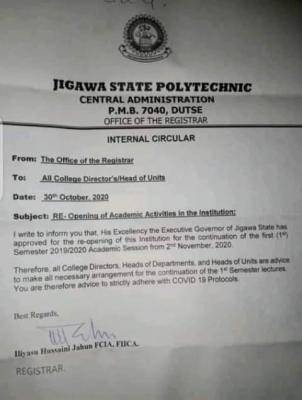
Polytechnics and universities both play crucial roles in the education sector, offering diverse opportunities for learning and career advancement. However, some popular courses are better suited to the hands-on, practical learning environment provided by polytechnics than the theoretical focus typical of universities. Below, we explore such courses, examining why polytechnics excel in their delivery.
Table of Contents
Toggle- 1. Engineering Technology
- 2. Hospitality and Tourism Management
- 3. Computer Science and Information Technology
- 4. Fashion Design and Textile Technology
- 5. Agricultural Technology
- 6. Business Administration and Management
- 7. Media and Communication Technology
- 8. Environmental Management Technology
- 9. Quantity Surveying
- 10. Art and Design
- 11. Welding and Fabrication Technology
- 12. Health Information Management
- 13. Automotive Technology
- 14. Building Technology
- 15. Food Technology
- Why Polytechnics Are Better for These Courses
- Conclusion
1. Engineering Technology
Polytechnics focus on applied engineering rather than theoretical concepts, making them ideal for courses like Mechanical, Electrical, and Civil Engineering Technology. Students gain practical experience in workshops, laboratories, and fieldwork, which is highly valued by employers in the manufacturing, construction, and energy sectors.
2. Hospitality and Tourism Management
This course thrives in polytechnics due to its emphasis on practical skills like culinary arts, event planning, and hospitality operations. Internships in hotels, restaurants, and tourism firms give students real-world exposure, preparing them for immediate employment upon graduation.
3. Computer Science and Information Technology
While universities often emphasize the theoretical underpinnings of computer science, polytechnics focus on coding, programming, and system management. Students frequently work on real-life projects, making them proficient in practical IT applications and problem-solving.
4. Fashion Design and Textile Technology
Fashion design is a specialized programme, polytechnics specializes in providing practical training in sewing, pattern making, and fabric design. Access to industrial-grade sewing machines and dyeing facilities ensures that students are industry-ready, often creating portfolios before graduation.
5. Agricultural Technology
Courses in agriculture, animal husbandry, and aquaculture benefit significantly from the practical training in polytechnics. Students engage in farm management, crop cultivation, and livestock care, gaining skills that are crucial for entrepreneurial ventures and sustainable farming.
6. Business Administration and Management
Polytechnic programs often include practical business simulations and case studies, focusing on entrepreneurship, small business management, and market research. This approach makes graduates well-prepared for real-world business challenges.
7. Media and Communication Technology
Polytechnics prioritize practical training in areas like video editing, sound production, and graphic design. Students gain hands-on experience using industry-standard tools and software, such as Adobe Creative Suite and Final Cut Pro, ensuring employability in the fast-paced media industry.
8. Environmental Management Technology
Polytechnic programs in this field include practical projects like waste management, pollution control, and environmental impact assessments. Hands-on fieldwork equips students with the technical skills required for jobs in environmental consulting and urban planning.
9. Quantity Surveying
This course combines construction technology and cost management, making the practical approach of polytechnics invaluable. Students work on building site assessments and budgeting exercises, making them ready for roles in construction firms and project management.
10. Art and Design
Polytechnics focuses on the creative and technical aspects of art and design, offering workshops in sculpture, painting, and digital arts. The practical nature of the training enables students to build comprehensive portfolios that showcase their skills to potential employers or clients.
11. Welding and Fabrication Technology
This highly specialized field benefits from polytechnics’ emphasis on practical skills. Students learn to operate cutting-edge welding equipment and apply techniques like MIG, TIG, and arc welding, making them industry-ready for roles in manufacturing and construction.
12. Health Information Management
Polytechnics provides hands-on training in maintaining medical records, coding health data, and managing hospital information systems. This practical focus ensures graduates are well-prepared for roles in healthcare facilities and public health organizations.
13. Automotive Technology
Polytechnics excel in this field due to their focus on practical skills in vehicle repair, maintenance, and diagnostics. Students often work with real vehicles in workshops, ensuring they graduate with the expertise to thrive in the automotive industry.
14. Building Technology
This course benefits from polytechnics’ strong emphasis on construction techniques, material testing, and project management. Practical training prepares students to oversee building projects and ensure compliance with safety standards.
15. Food Technology
Polytechnics provide hands-on training in food processing, quality control, and packaging. Access to state-of-the-art equipment ensures that students gain practical knowledge, preparing them for roles in the food and beverage industry.
Why Polytechnics Are Better for These Courses
- Hands-On Training: Polytechnics are designed to equip students with practical skills that can be immediately applied in the workforce. Many of the courses mentioned involve laboratory sessions, internships, and industrial attachments, which are often limited in universities.
- Industry Partnerships: Polytechnics frequently collaborate with industries, ensuring that their curricula align with current market demands. This leads to higher employability rates for polytechnic graduates.
- Cost-Effectiveness: Polytechnic education is often more affordable than university programs, making it accessible to a broader range of students while still delivering quality education.
- Shorter Program Duration: Most polytechnic courses take less time to complete than university degrees, enabling students to enter the workforce earlier and gain valuable experience.
- Focus on Vocational Skills: Polytechnics emphasize vocational training, which is essential for technical and creative fields. This practical approach ensures graduates are job-ready and adaptable to various roles.
Conclusion
Polytechnics provide an ideal learning environment for courses that demand practical skills and real-world experience. For students seeking immediate employability and a hands-on approach to education, these courses offer excellent opportunities to excel in their chosen fields. While universities have their strengths, polytechnics often deliver superior training for careers that require technical expertise and vocational skills.




